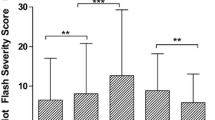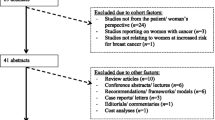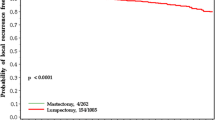Abstract
We utilized data from the comparison group of the Women’s Healthy Eating and Living randomized trial to investigate an “a priori” hypothesis suggested by CYP2D6 studies that hot flashes may be an independent predictor of tamoxifen efficacy. A total of 1551 women with early stage breast cancer were enrolled and randomized to the comparison group of the WHEL multi-institutional trial between 1995 and 2000. Their primary breast cancer diagnoses were between 1991 and 2000. At study entry, 864 (56%) of these women were taking tamoxifen, and hot flashes were reported by 674 (78%). After 7.3 years of follow-up, 127 of those who took tamoxifen at baseline had a confirmed breast cancer recurrence. Women who reported hot flashes at baseline were less likely to develop recurrent breast cancer than those who did not report hot flashes (12.9% vs 21%, P = 0.01). Hot flashes were a stronger predictor of breast cancer specific outcome than age, hormone receptor status, or even the difference in the stage of the cancer at diagnosis (Stage I versus Stage II). These findings suggest an association between side effects, efficacy, and tamoxifen metabolism. The strength of this finding suggests that further study of the relationship between hot flashes and breast cancer progression is warranted. Additional work is warranted to clarify the mechanism of hot flashes in this setting.



Similar content being viewed by others
Explore related subjects
Discover the latest articles and news from researchers in related subjects, suggested using machine learning.References
Stearns V, Johnson MD, Rae JM et al (2003) Active tamoxifen metabolite plasma concentrations after coadministration of tamoxifen and the selective serotonin reuptake inhibitor paroxetine. J Natl Cancer Inst 95(23):1758–1764
Borges S, Desta Z, Li L et al (2006) Quantitative effect of CYP2D6 genotype and inhibitors on tamoxifen metabolism: implication for optimization of breast cancer treatment. Clin Pharmacol Ther 80(1):61–74
Desta Z, Ward BA, Soukhova NV et al (2004) Comprehensive evaluation of tamoxifen sequential biotransformation by the human cytochrome P450 system in vitro: prominent roles for CYP3A and CYP2D6. J Pharmacol Exp Ther 310(3):1062–1075
Goetz MP, Rae JM, Suman VJ et al (2005) Pharmacogenetics of tamoxifen biotransformation is associated with clinical outcomes of efficacy and hot flashes. J Clin Oncol 23(36):9312–9318
Freedman RR, Blacker CM (2002) Estrogen raises the sweating threshold in postmenopausal women with hot flashes. Fertil Steril 77(3):487–490
Stearns V, Ullmer L, Lopez JF et al (2002) Hot flushes. Lancet 360(9348):1851–1861
Kronenberg F (1990) Hot flashes: epidemiology and physiology. Ann NY Acad Sci 592:52–86; discussion 123–133
Carpenter JS, Andrykowski MA, Cordova M et al (1998) Hot flashes in postmenopausal women treated for breast carcinoma: prevalence, severity, correlates, management, and relation to quality of life. Cancer 82(9):1682–1691
Couzi RJ, Helzlsouer KJ, Fetting JH (1995) Prevalence of menopausal symptoms among women with a history of breast cancer and attitudes toward estrogen replacement therapy. J Clin Oncol 13(11):2737–2744
Avis NE, Brockwell S, Colvin A (2005) A universal menopausal syndrome?. Am J Med 118(12 Suppl 2):37–46
Hickey M, Saunders CM, Stuckey BG (2005) Management of menopausal symptoms in patients with breast cancer: an evidence-based approach. Lancet Oncol 6(9):687–695
Pierce JP, Faerber S, Wright FA et al (2002) A randomized trial of the effect of a plant-based dietary pattern on additional breast cancer events and survival: the Women’s Healthy Eating and Living (WHEL) Study. Control Clin Trials 23(6):728–756
Matthews KA, Shumaker SA, Bowen DJ et al (1997) Women’s health initiative. Why now? What is it? What’s new? Am Psychol 52(2):101–116
Bardwell WA Major JM, Rock CL, Newman VA, Thomson CA, Chilton JA, Dimsdale JE, Pierce JP (2004) Health-related quality of life in women previously treated for early-stage breast cancer. Psychooncology 13(9):595–604
Goetz MP, Knox SK, Suman VJ et al (2007) The impact of cytochrome P450 2D6 metabolism in women receiving adjuvant tamoxifen. Breast Cancer Res Treat 101(1):113–121
Casper RF, Yen SS (1985) Neuroendocrinology of menopausal flushes: an hypothesis of flush mechanism. Clin Endocrinol (Oxf) 22(3):293–312
Acknowledgements
The Women’s Healthy Eating and Living (WHEL) Study was initiated with the support of the Walton Family Foundation and continued with funding from NCI grant CA 69375.
Author information
Authors and Affiliations
Consortia
Corresponding author
Additional information
The Women’s Healthy Eating and Living (WHEL) Study Group: WHEL Study Coordinating Center: University of California, San Diego, Cancer Prevention and Control Program, San Diego, California: Dr. John P. Pierce (Principal Investigator), Dr. Barbara A. Parker (Medical Director), Dr. Wayne Bardwell, Susan Faerber, Shirley W. Flatt, Sheila Kealey, Dr. Loki Natarajan, Vicky Newman, Dr. Cheryl L. Rock; Whel Study Clinic Sites: Center For Health Research, Portland, Oregon: Dr. Njeri Karanja, Dr. Mark Rarick; Kaiser Permanente Northern California, Oakland, California: Dr. Bette J. Caan, Dr. Lou Fehrenbacher; Northern California Cancer Center, Palo Alto, California: Dr. Marcia L. Stefanick, Dr. Robert Carlson; University Of Arizona, Tucson And Phoenix, Arizona: Dr. Cynthia Thomson, Dr. James Warnecke; University Of California, Davis, Davis, California: Dr. Ellen B. Gold, Dr. Sidney Scudder; University Of California, San Diego Cancer Center, San Diego, California: Dr. Kathryn A. Hollenbach, Dr. Linda Wasserman; University Of Texas M. D. Anderson Cancer Center, Houston, Texas: Dr. Lovell A. Jones, Dr. Richard Theriault.
Rights and permissions
About this article
Cite this article
Mortimer, J.E., Flatt, S.W., Parker, B.A. et al. Tamoxifen, hot flashes and recurrence in breast cancer. Breast Cancer Res Treat 108, 421–426 (2008). https://doi.org/10.1007/s10549-007-9612-x
Received:
Accepted:
Published:
Issue Date:
DOI: https://doi.org/10.1007/s10549-007-9612-x




